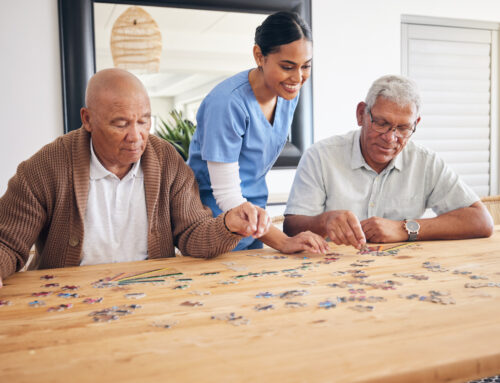Whether it’s working from home, social distancing, or dealing with virtual education for children, life has been altered dramatically because of COVID-19. The pandemic has also led to increases in stress and anxiety levels for many adults, including seniors who have found themselves dealing with loneliness due to social isolation. Overall, one in four (24%) adults ages 65 and older reported anxiety or depression in a survey conducted in August 2020. This rate is substantially higher than the one in 10 (11%) of older adults with Medicare who reported depression or anxiety in 2018 (based on a 2018 Medicare Current Beneficiary Survey). So, how do we ensure that seniors are getting the help and support they need when there are still stay-at-home directives in many places? Fortunately, telemedicine provides options for receiving care while also remaining safe in one’s own home. FirstLantic.com explores three other reasons for seniors to take advantage of mental telehealth services and provide guidance on ensuring they feel as comfortable with virtual visits as they do with in-person visits.
The first benefit for seniors is obviously convenience. For some people who may have mobility issues or no longer drive, telemedicine’s ease of access is highly beneficial. And for some older adults, the process of getting to an appointment is not the only problem. For a person with arthritis, sitting for a certain length of time in a waiting room can be painful.
The second benefit is access to specialists. For seniors that live in rural areas, they may not have local options for specialized care such as psychiatry or therapy. As Dr. Craig Beach says, “Telepsychiatry and teletherapy can substantially reduce the grossly unequal geographic distribution of health care manpower in addition to greater efficiency and high diagnostic reliability.”
The third benefit is the comfort of speaking with a specialist from a private and comfortable setting. For older adults who may not want to admit they need help, it can be less intimidating to speak with someone about mental health issues outside of a clinical environment. Research shows that 62% of patients prefer a virtual mental health visit versus one in person. And in some cases, people suffering from severe mental health issues such as depression or trauma are simply unable to leave their homes due to their illness.
So, while the benefits are numerous, what are some of the things that would be useful for older patients to know before seeking treatment? First of all, do your due diligence. Research the professional’s credentials, including ensuring they have a license to deliver mental health services virtually. Ask about how they organize their treatment since a structured process is critical to specific mental health treatments. Inquire about how their services are delivered. Some counseling done via chat or email without any video can severely limit the treatment’s successful outcomes and are not recommended for more severe mental illness treatments. And, if you are not comfortable with the technology piece of therapy, don’t be embarrassed. Let your provider know so that they provide written directions or can have someone walk you through how to use video for your treatment. There are also services that can teach seniors how to use video confidently.
In summary, while access and delivery of telehealth services can be very beneficial, it is critical to evaluate whether those services meet your needs as a patient. That said, there is no doubt that telemedicine will continue to grow and profoundly change how many people receive their care in the future. As Dr. Beach summarizes, “Mental telehealth therapy is both safe and has high reliability. It can also provide much-needed treatment for patients who might not have access otherwise. Recently, I had the pleasure of working with a senior who did not have transportation options available for weekly therapy sessions. Without virtual visits, he would not have had the option to receive treatment. I am pleased that we were able to offer him effective care without him having to worry about leaving his home.”
Read more blogs from FirstLantic
 AVAILABLE 24 HOURS A DAY/7 DAYS A WEEK
AVAILABLE 24 HOURS A DAY/7 DAYS A WEEK Careers
Careers







